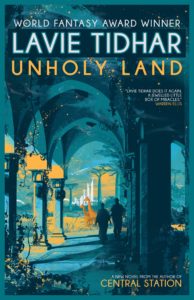Synopsis: An Alternate Universe fic where the Jewish state is created in Uganda in 1903 (actual thing that came close to happening).
Book Review: I didn’t like it, mainly for personal reasons.
First, the writing style was unbearable. I know I lean purple in my taste. I like flowery, lyrical writing. I love everything Catherine Valente touchers. I even enjoyed the overwrought gothic style of Twilight. Unholy Land is the opposite of that. The prose is utterly flat. It just lies there, dead on the page. Like so:
“He said nothing. His breath was labored and it was loud in the room. The room was underground. The walls were strong.”
or
“The sunlight was white on the hills.”
It made reading difficult, because I was so bored my mind would wander. I had to force my attention back to the page. I guess he was trying to do the spare Hemingway thing, but it didn’t work out well IMO.
Second, he had lots of cool things that were briefly introduced, but never did anything. Like introducing the kabbalistic Tree of Life as a map for travelling between the various realities, and using kabbalah to twist them. But it’s just a hint and then it’s dropped and it’s frustrating as hell to be teased in this way. It gives the distinct impression that Tidhar thought “This would be cool if it was ever developed, so I’ll just drop it in,” but doing so without developing it or thinking about it just makes it feel shallow and tacked-on. Pointing out a part of you world to say “This could be really cool if this thing was done!” only highlights how lame it is in comparison since that thing wasn’t done. It would have been better off not introduced at all. At least IMO. Again, my complaints about this book are personal-taste in nature.
Thirdly, Tidhar goes to pains to point out–from within the text–that this novel is just pulp trash and shouldn’t be taken seriously. It’s a “Haha, only serious,” kinda thing, because obviously he does want it taken seriously, he has some serious things to say. Which is fine. Pulp can say serious things. But when on more than one occasion the author lampshades how trashy and pulpy the novel is, so you can just ignore anything that doesn’t make perfect sense because none of this is Serious Literature anyway, it infuriates me. Genre Fic has long had Serious People looking down their noses at it, saying it can’t say anything of substance because it’s not Real Literature. For Tidhar to buy into this and perpetuate it, especially as an excuse to preemptively deflect criticism, soured me on the novel. If you’re gonna say serious shit, say your serious shit, and don’t go making excuses and abasing yourself before the EarthFic Snobs who’ll never accept you anyway.
That being said, there are a few parts in here that really do shine. When Tidhar does decide to get philosophical he does so really well. The blurring of identities when you switch between realities was fascinating. His portrayal of someone trying to escape from themselves is great. I enjoyed his use of 1st/2nd/3rd person and the way it allowed him to seamlessly transition between viewpoint changes, although I think it was a bit of a wasted opportunity… he could have done more with it.
And the theme is one I love. The theme comes down to “You can change details, change circumstances, but ultimately that doesn’t solve anything. Because the problems are bigger than some details. The problem is within the person. No matter how much you change things, people stay the same, and so will their problems.”
But… well… I’ve seen this theme done before. And done far better. Tidhar shows us one alternate reality, and how things repeat even when the circumstances are different. He hints at others. There’s a book that shows us this process occurring again and again, with the same cast of characters, repeating the same tragedies over at least a half-dozen universes, in a half-dozen different bodies. But always the core people are the same, and nothing is different because the fault is in them, to the point that they can be reified into god-like archetypes and myths that span millennia and societies. It’s not a fair criticism of Tidhar’s book to say “I read a different book that did this better,” so I apologize for doing so. But I’m just not that impressed with Unholy Land since I have Vellum to compare it to.
In short, Not Recommended.
Book Club Review: As a book club book, this went pretty well. Despite its flaws, it does have several things to say, which will prompt discussion. Since the things I disliked about the book were primarily personal taste things, most other people didn’t dislike those things. But I hold to the idea that most of what this novel does have to say is pretty surface-level, and the novel doesn’t seem to aspire to the levels it should or could (…and very consciously so). It’s better than your average book in terms of book clubs and discussions, but it falls short of a strong recommendation. I suppose… Mild Approval, If You’re Curious.

